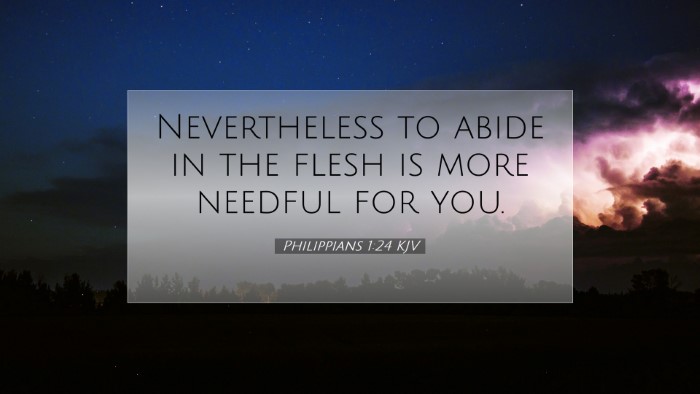Philippians 1:24 - Commentary
Philippians 1:24 states, "But to remain in the flesh is more needful for you." This verse encapsulates the Apostle Paul's reflections on the tension between his desire for heavenly reward and his commitment to the needs of the Philippian church. Below, we explore various insights from notable public domain commentators.
Contextual Background
The Apostle Paul, writing from prison, addresses the Philippian believers. His words reveal not just his circumstances but his theological reflections on life, death, and service. Paul recognizes the struggle between his longing for heaven and his earthly responsibilities.
Insights from Matthew Henry
Matthew Henry emphasizes the following points regarding this passage:
- Selflessness in Ministry: Henry notes that Paul’s consideration of the needs of the Philippians over his own preference for departure illustrates the essence of selfless ministry. Paul willingly prioritizes the spiritual welfare of others.
- Joy in Suffering: In Paul’s acknowledgement of staying in the flesh, Henry suggests that enduring difficulty often brings greater joy to the believers he serves. For Paul, ministering to the Philippians is a source of joy amidst his suffering.
- Divine Providence: Henry highlights God’s providence in deciding when believers are taken from this life. Paul is resigned to God’s plan, believing that his continued presence would be beneficial for others.
Insights from Albert Barnes
Albert Barnes provides a detailed examination of Paul’s thought process in this verse:
- The Value of Life: Barnes asserts that life holds intrinsic value not only for oneself but for others. Paul recognizes the importance of his role in the growth and comfort of the Philippian church.
- The Duty of Apostolic Ministry: According to Barnes, Paul feels compelled to fulfill his duty. His decision to remain is motivated by his sense of obligation to teach, guide, and strengthen the faithful.
- The Hope of Glory vs. Earthly Work: While Paul yearns for the ‘better part’ of departing to be with Christ, he balances this with the necessity of labor in the gospel. This reflects a profound understanding of the dual aspects of faith and duty.
Insights from Adam Clarke
Adam Clarke elaborates on several themes that arise in Paul’s statement:
- Personal Aspirations vs. Community Needs: Clarke observes the conflict in Paul’s heart between his desire for spiritual fulfillment and his responsibility towards the community. His willingness to defer personal desires for the sake of others is a key theme.
- The Role of an Apostle: Clarke places emphasis on the role of apostolic authority, which entails sacrifice. Paul views his continued life as essential to encouraging faith within the church community.
- The Importance of Intercession: Clarke reflects on how Paul’s intercession for the Philippians showcases his love and dedication. His insight into their trials drives his decision-making, highlighting the interconnectedness of believers.
Theological Implications
This verse serves as a foundation for understanding the theological implications of life, service, and the believer's role within the context of community. The tension Paul expresses embodies significant teachings relevant to pastoral care and ecclesiastical responsibilities:
- Self-Denial: Reflecting Christ’s teachings, Paul exemplifies self-denial. Leaders are called to prioritize their congregation's needs over personal ambition, mirroring Christ’s sacrificial love.
- Mutual Support in the Body of Christ: Paul's commitment extends beyond himself, suggesting a robust doctrine of mutual dependence among believers. This shapes ecclesiology, affirming that no one exists in isolation.
- Living with Purpose: The idea that every believer's existence serves a purpose for others maintains unity and encourages vocational diligence among church leaders and members alike.
Conclusion
Philippians 1:24 challenges both contemporary pastors and scholars alike to consider what it means to serve with dedication and love. Paul's model of service invites us to reflect on the weight of our responsibilities towards others in our communities and how this shapes our faith journey. In prioritizing the needs of those we serve, we align ourselves with the heart of Christ, which not only inspires the church but fulfills God's overarching purpose for His people.


